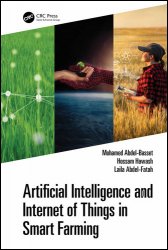Artificial Intelligence and Internet of Things in Smart Farming
- Добавил: literator
- Дата: 29-01-2024, 06:27
- Комментариев: 0
 Название: Artificial Intelligence and Internet of Things in Smart Farming
Название: Artificial Intelligence and Internet of Things in Smart FarmingАвтор: Mohamed Abdel-Basset, Hossam Hawash
Издательство: CRC Press
Год: 2024
Страниц: 315
Язык: английский
Формат: pdf (true)
Размер: 10.1 MB
This book provides a broad overview of the areas of Artificial Intelligence (AI) that can be used for smart farming applications, through either successful engineering or ground-breaking research. Among them, the highlighted tactics are soil management, water management, crop management, livestock management, harvesting, and the integration of Internet of Things (IoT) in smart farming.
Artificial Intelligence and Internet of Things in Smart Farming explores different types of smart framing systems for achieving sustainability goals in the real environment. The authors discuss the benefits of smart harvesting systems over traditional harvesting methods, including decreased labor requirements, increased crop yields, increased probabilities of successful harvests, enhanced visibility into crop health, and lower overall harvest and production costs. It explains and describes big data in terms of its potential five dimensions—volume, velocity, variety, veracity, and valuation—within the framework of smart farming. The authors also discuss the recent IoT technologies, such as fifth-generation networks, blockchain, and digital twining, to improve the sustainability and productivity of smart farming systems. The book identifies numerous issues that call for conceptual innovation and has the potential to progress Machine Learning (ML), resulting in significant impacts. As an illustration, the authors point out how smart farming offers an intriguing field for interpretable ML. The book then delves into the function of AI techniques, such as AI in accelerating the development of nano-enabled agriculture, thereby facilitating safe-by-design nanomaterials for various consumer products and medical applications.
A variety of tools and techniques are available to support data visualization and decision-making in smart farming. Data visualization tools, such as Tableau, PowerBI, and Python libraries like Matplotlib, Seaborn, and Plotly, offer a wide range of options for creating visually appealing representations of sensor data. These tools allow farmers to customize and create interactive dashboards, charts, and maps to suit their specific needs. Geographic Information Systems (GIS) software, such as ArcGIS and QGIS, enable spatial analysis and mapping of sensor data, facilitating site-specific decision-making and precision agriculture practices. DSS can be developed using programming languages like Python or R, leveraging Machine Learning libraries such as Scikit-learn, TensorFlow, or PyTorch for data analysis and model development.
This book is for undergraduate students, graduate students, researchers, and AI engineers who pursue a strong understanding of the practical methods of machine learning in the agriculture domain. Practitioners and stakeholders would be able to follow this book to understand the potential of ML in their farming projects and agricultural solutions.
Features:
• Explores different types of smart framing systems for achieving sustainability goals in the real environment
• Explores ML-based analytics such as generative adversarial networks (GAN), autoencoders, computational imaging, and quantum computing
• Examines the development of intelligent machines to provide solutions to real-world problems, emphasizing smart farming applications, which are not modeled or are extremely difficult to model mathematically
• Emphasizes methods for better managing crops, soils, water, and livestock, urging investors and businesspeople to occupy the existing vacant market area
• Discusses AI-empowered Nanotechnology for smart farming
In Chapter 1, “Introduction to Smart Farming,” we lay the foundation by discussing the limitations of traditional farming, from resource-intensive practices to economic pressures and climate vulnerability. We then define smart farming and explore the technologies that make it possible, such as Artificial Intelligence, Big Data, and blockchain.
Chapter 2, “Big Data in Smart Farming,” takes a closer look at how Big Data is transforming agriculture. We explore different types of smart farming data, the dimensions of Big Data, and its applications across various farming practices.
Moving forward, Chapter 3, “Conceptualization of Machine Learning for Smart Farming,” introduces machine learning (ML) as a critical tool in modern agriculture. We classify different types of ML algorithms and discuss their applications in optimizing crop yield, detecting diseases, and automating various farming processes.
Chapter 4, “From Field to Database: Sensors, Data Collection, and Efficient Management in Smart Farming,” delves into the world of agricultural sensors. We explore the wide array of sensor types and their applications in monitoring soil health, plant conditions, water quality, and livestock behavior. Additionally, we discuss how data from these sensors are collected, managed, and processed to drive informed decisions in smart farming.
...
In Chapter 9, “The Convergence of AI and IoT in Smart Farming,” we explore the powerful synergy between artificial intelligence and the Internet of Things in agriculture. The chapter discusses how this convergence enhances automation, data analytics, and decision-making in farming.
Lastly, Chapter 10, “Toward Agriculture 5.0: The Convergence of Machine Learning and Nanotechnology for Next-Generation Farming,” ventures into the realm of nanotechnology in smart farming. We explore the applications of nanomaterials, nanosensors, and nanobots, along with the integration of Machine Learning to improve agricultural practices.
Скачать Artificial Intelligence and Internet of Things in Smart Farming
Внимание
Уважаемый посетитель, Вы зашли на сайт как незарегистрированный пользователь.
Мы рекомендуем Вам зарегистрироваться либо войти на сайт под своим именем.
Уважаемый посетитель, Вы зашли на сайт как незарегистрированный пользователь.
Мы рекомендуем Вам зарегистрироваться либо войти на сайт под своим именем.
Информация
Посетители, находящиеся в группе Гости, не могут оставлять комментарии к данной публикации.
Посетители, находящиеся в группе Гости, не могут оставлять комментарии к данной публикации.
